6 Islamic Dua For Death in Arabic, Transliteration, And Meaning
Death is a natural part of the human experience, yet it remains one of the most difficult and emotionally challenging events that we face. When someone we love passes away, we are often overwhelmed with feelings of sadness, grief, and loss.
Advertisements
In this blog post, we will explore the meaning and importance of dua for death, and how it can be used as a tool for coping with loss and grief.
Dua For Death In Arabic
Upon Hearing the news of someone who just passed away the first Arabic Dua to recite at the time of death is:
إِنَّا لِلَّهِ وَإِنَّآ إِلَيْهِ رَٰجِعُونَ
Transliteration
Inna lillahi wa inna ilaihi rajiun
Advertisements
Meaning in English
The general meaning of death Dua is We belong to Allah and to Him we shall return.
You should only supplicate for good and say that which the Prophet SAW has instructed us to say.
For the affliction of death, you should add:
اللَّهُمَّ أجُرْنِي فِي مُصِيْبَتي، وأخْلِفْ لِي خَيْراً مِنْهَا
Transliteration: Allahumma Ajjurni fi musibati wakhlufli khairan minha.
Advertisements
Meaning: O Allah compensate me in my affliction, recompense my loss and give me something better in exchange for it.
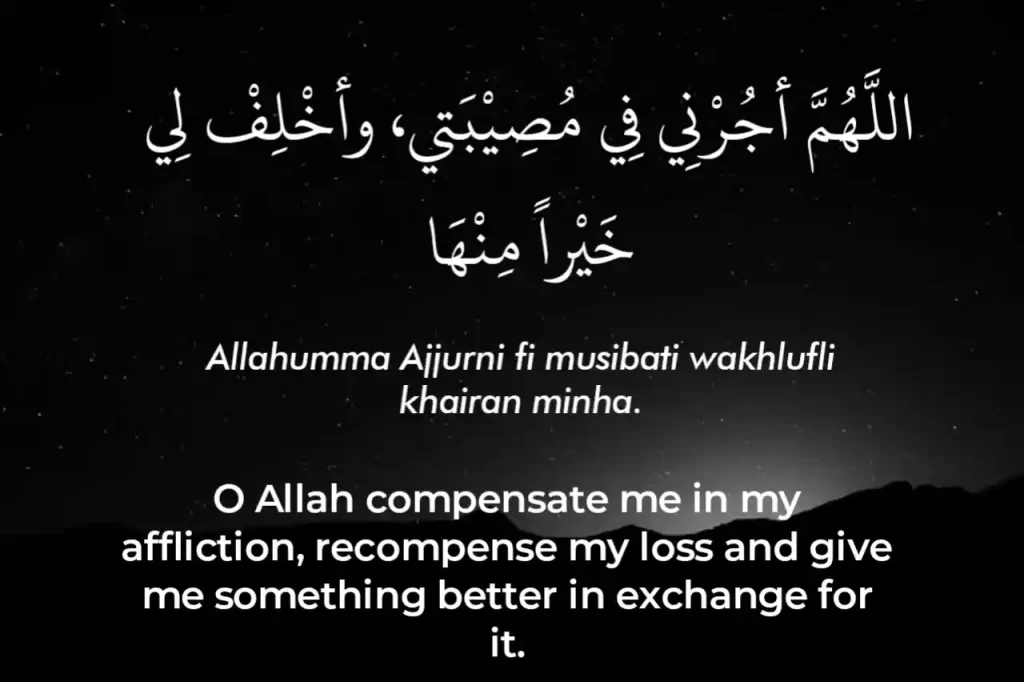
Islamic Dua for Death
This is the Dua for the death person in Arabic:
اللَّهمَّ اغْفِرْ لَه ُُ وَارْحَمْهُ، وَعَافِه ِِ وَاعْفُ عَنْهُ، وَأَكْرِمْ نُزُلَهُ، وَوَسِّعْ مُدْخَلَهُ، وَاغْسِلْهُ بِالمَاءِ وَالثَّلْجِ وَالبَرَدِ، وَنَقِّه ِِ مِنَ الخَطَايَا كَمَا نَقَّيْتَ الثَّوْبَ الأَبْيَضَ مِنَ الدَّنَسِ، وَأَبْدِلْهُ دَاراً خَيْرا ً مِنْ دَارِهِ، وَأَهْلاً خَيْرا ً مِنْ أَهْلِهِ، وَزَوْجَاً خَيْرا ً مِنْ زَوْجِهِ، وَأَدْخِلْهُ الجَنَّةَ، وَأَعِذْهُ مِنْ عَذَابِ القَبْرِ وَعَذَابِ النَّار
Advertisements
Transliteration
Allahummaghfir lahu, warhamhu, wa ‘afihi, wafu ‘anhu, wa akrim nuzulahu, wa wassi‘ mudkhalahu, waghsilhu bil-ma’i wath-thalji wal-baradi, wa naqqihi minal-khataya, kama naqqaytath-thawbal-abyada minad-danasi, wa abdilhu daran khairan min darihi, wa ahlan khairan min ahlihi, wa zawjan khairan min zawjihi, wa adkhilhul-Jannata, wa a‘idh- hu min ‘adhabil-qabri, wa min ‘adhabin-nar.
Meaning
O Allah! Forgive him, bestow mercy upon him, pardon him, accord him a noble provision and make his grave spacious, wash him with water, snow and hail, purify him from sins as You have purified the white garment from soiling,
give him a better abode in place of his present one, and a better family in exchange of his present one, and a better spouse in place of his present wife; admit him to Jannah and protect from the trial in the grave and punishment in the Hell.
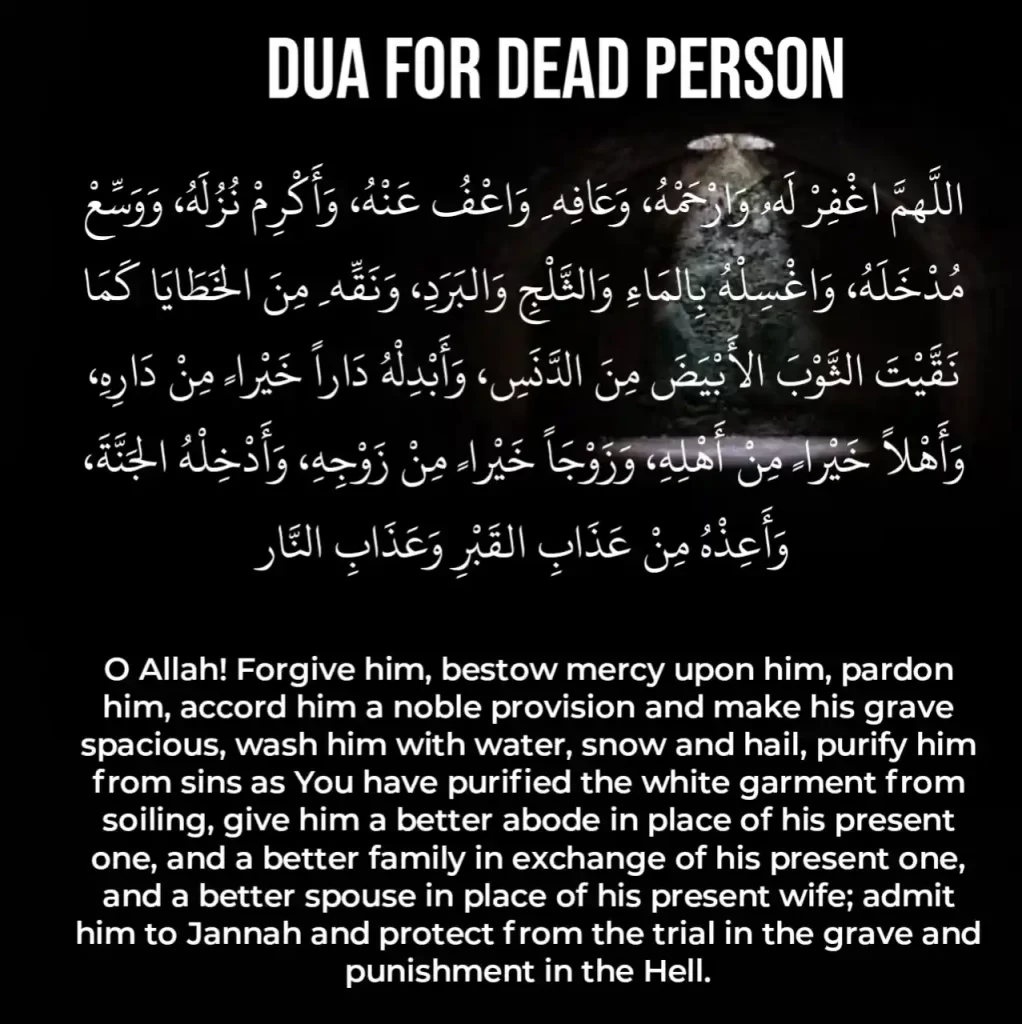
Abu Abdur-Rahman Auf bin Malik reported: The Messenger of Allah SAW offered a funeral prayer and he memorized the above supplication.
After hearing this supplication of the Messenger of Allah SAW, Abu Abdur-Rahman Auf bin Malik said: I wished I had been that dead man. [Muslim]
Dua On Death At The Funeral
اللَّهُمَّ إِنَّ فُلاَنَ بْنَ فُلاَنٍ فِي ذِمَّتِكَ، وَحَبْلِ جِوَارِكَ، فَقِهِ مِنْ فِتْنَةِ الْقَبْرِ، وَعَذَابِ النَّارِ، وَأَنْتَ أَهْلُ الْوَفَاءِ وَالْحَقِّ، فَاغْفِرْ لَهُ وَارْحَمْهُ إِنَّكَ أَنْتَ الغَفُورُ الرَّحِيمُ
Transliteration
Allaahumma ‘inna [name the person] fee thimmatika, wa habli jiwaarika, faqihi min fitnatil-qabri wa ‘athaabin-naari, wa ‘Anta ‘ahlul-wafaa’i walhaqqi. Faghfir lahu warham hu ‘innaka ‘Antal-Ghafoorur-Raheem.
Meaning
O Allah, surely [name the person] is under Your protection, and in the rope of Your security, so save him from the trial of the grave and from the punishment of the Fire. You fulfill promises and grant rights, so forgive him and have mercy on him. Surely You are Most Forgiving, Most Merciful.

Reference: Ibn Majah, Abu Dawud 3/211. See also Al Albani, Sahih Ibn Majah 1/251.
Dua For Who Passed Away
اللَّهُمَّ عَبْدُكَ وَابْنُ أَمَتِكَ احْتَاجَ إِلَى رَحْمَتِكَ، وَأَنْتَ غَنِيٌّ عَنْ عَذَابِهِ، إِنْ كَانَ مُحْسِناً فَزِدْ فِي حَسَنَاتِهِ، وَإِنْ كَانَ مُسِيئاً فَتَجَاوَزْ عَنْهُ
Transliteration
Allaahumma ‘abduka wabnu ‘amatika ihtaaja ‘ilaa rahmatika, wa ‘Anta ghaniyyun ‘an ‘athaabihi, ‘in kaana muhsinan fazid fee hasanaatihi, wa ‘in kaana musee’an fatajaawaz ‘anhu.
Meaning
O Allah, Your male slave and the child of Your female slave is in need of Your mercy, and You are not in need of his torment. If he was pious then increase his rewards and if he was a transgressor then pardon him.
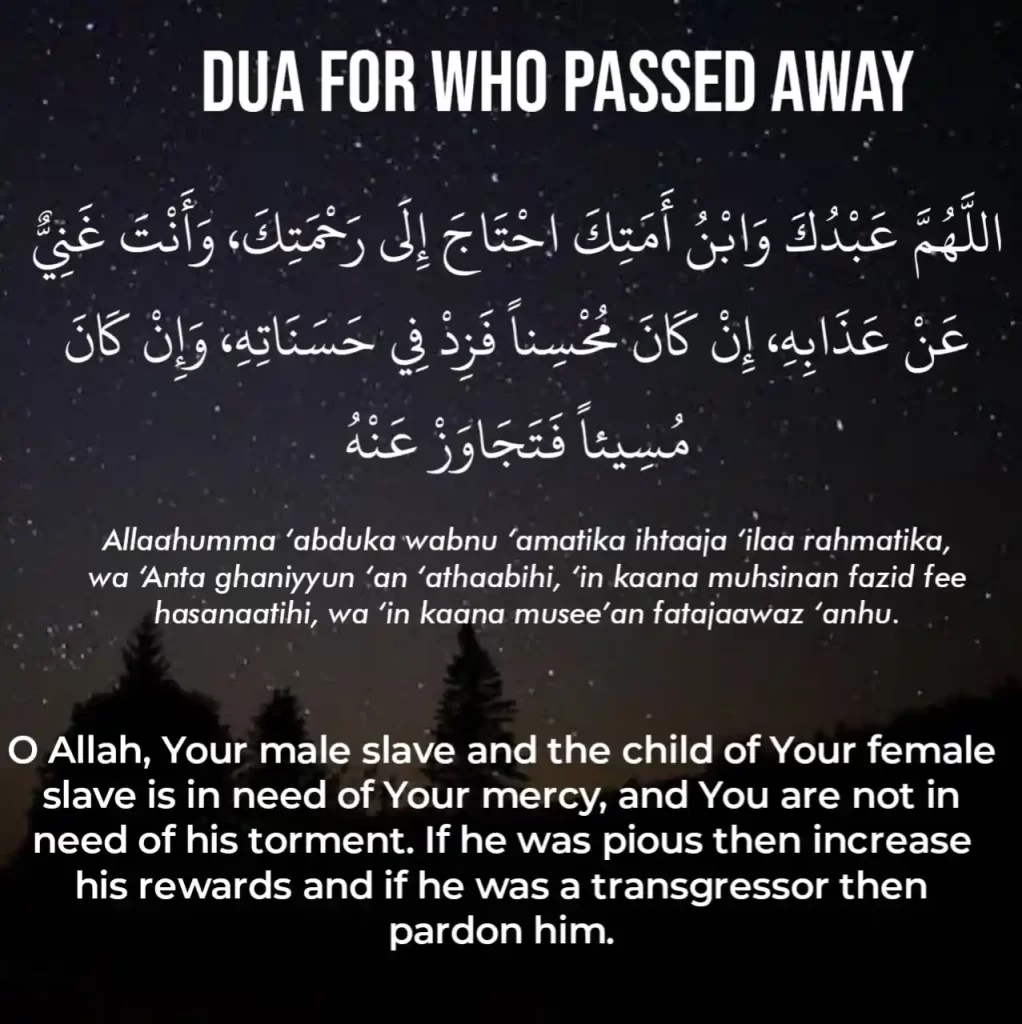
Reference: Al-Hakim 1/359 who graded it authentic and Ath-Thahabi agreed with him. See also Al-Albani, Ahkamul-Jana’iz, p. 125.
Dua For The Death
اللهُـمِّ اغْفِـرْ لِحَيِّـنا وَمَيِّتِـنا، وَشـاهِدِنا وَغائِبِـنا، وَصَغيـرِنا وَكَبيـرِنا، وَذَكَـرِنا وَأُنْثـانا. اللهُـمِّ مَنْ أَحْيَيْـتَهُ مِنّا فَأَحْيِـهِ عَلى الإِسْلام، وَمَنْ تَوَفَّـيْتَهُ مِنّا فَتَوَفَّـهُ عَلى الإِيـمان، اللهُـمِّ لا تَحْـرِمْنـا أَجْـرَه، وَلا تُضِـلَّنا بَعْـدَه
Transliteration
Allaahum-maghfir lihayyinaa, wa mayyitinaa, wa shaahidinaa, wa ghaa’ibinaa, wa sagheerinaa wa kabeerinaa, wa thakarinaa wa ‘unthaanaa. Allaahumma man ‘ahyaytahu minnaa fa’ahyihi ‘alal-‘Islaami, wa man tawaffaytahu minnaa fatawaffahu ‘alal-‘eemaani, Allaahumma laa tahrimnaa ‘ajrahu wa laa tudhillanaa ba’dahu.
Translation in English
O Allah forgive our living and our dead, those who are with us and those who are absent, our young and our old, our menfolk and our womenfolk.
O Allah, whomever you give life from among us give him life in Islam, and whomever you take way from us take him away in Faith. O Allah, do not forbid us their reward and do not send us astray after them. [bn Majah 1/480]
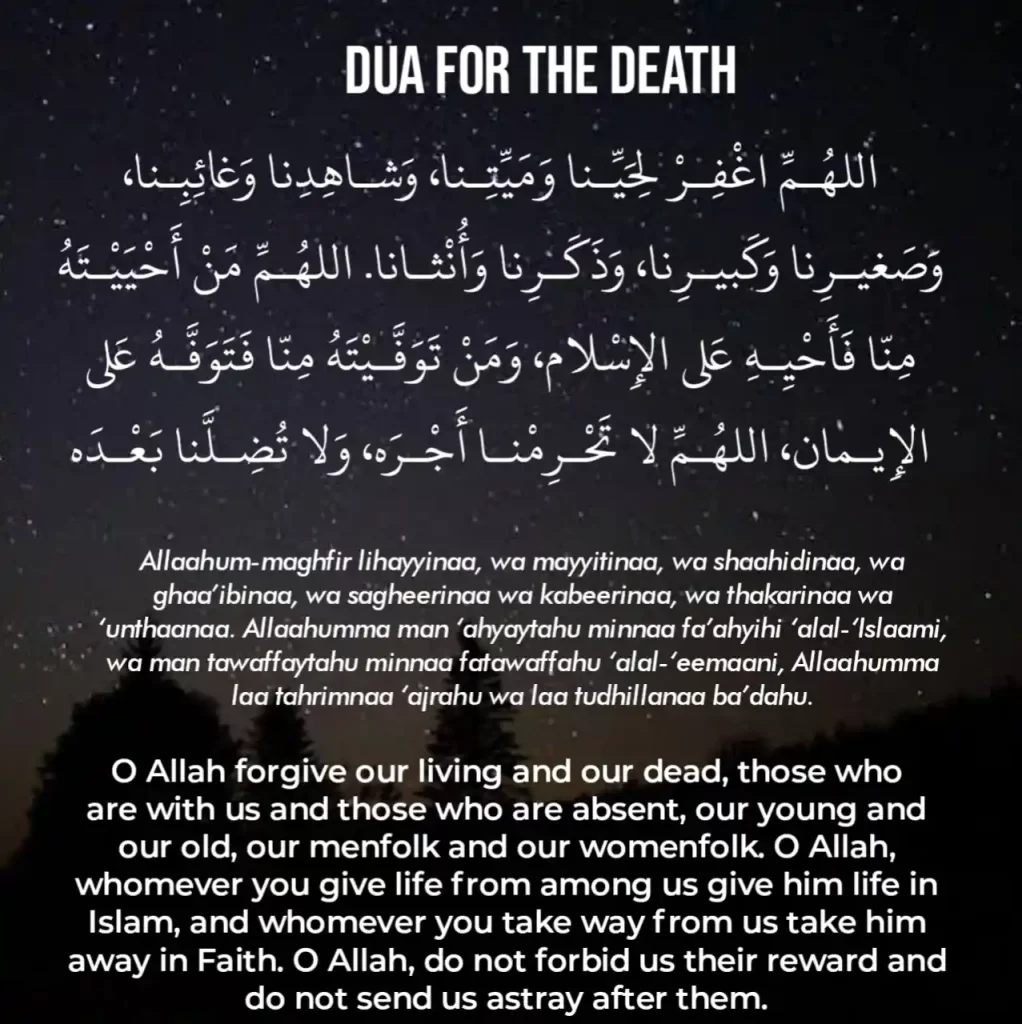
You may also like:
- 5 Dua For Sick Child (Child Health)
- Dua For Heartbreak
- Dua For The Last 10 Days of Ramadan In Arabic and Meaning
Umm Salamah RA reported: The Messenger of Allah SAW visited Abu Salamah RA when his eyes were open soon after he died.
He closed them (the eyes) for him and said, “When the soul is taken away, the sight follows it.” Some members of his family began to weep.
He SAW said: “Do not supplicate for yourselves anything but good, for the angels say ‘Amin’ to what you say.”
Then he is said, “O Allah! Forgive Abu Salamah, raise his rank among those who arerightly-guided and grant him a successor from his descendants who remain behind. Grant him pardon and us, too. O Rabb of the worlds. Make his grave spacious for him and give him light in it.”
Muslim
The author An Nawawi – may Allah shower blessings on him – said in his book, Riyaadus Saaliheen: ‘Chapter on What to Say Soon after A Person’s Death.’
At the point of death, the eyes of the dying person open wide to witness the soul as it exits the body.
While leaving the body, the soul has a body which is visible to the dying person and the angels who would receive it but not to mankind.
The Prophet SAW went to see Aboo Salamah as was his practice to visit the sick. He entered upon him and met his eyes wide open, and he SAW realized that he had passed away.
So he said: ‘When the soul is taken away, the sight follows it.’ Some members of his family began to weep when they heard this statement of the Prophet SAW.
They realized that the man had died and they began to lament as was the common practice. The Prophet SAW said: ‘Do not supplicate for yourselves anything but good, for the angels say Ameen to what you say.’
During the age of Ignorance, before the advent of Islam, people would rain curses on themselves, refuge is with Allah.
They would say: ‘Woe upon us, perdition has befallen us’ and other similar statements.
So, the Prophet SAW said: ‘Do not supplicate for yourselves anything but good, for the angels say Ameen to what you say.’
In this sort of situation, one should only supplicate for good and say that which the Prophet SAW has instructed him to say:
‘Allahumma Ajjurni fi musibati wakhlufli khairan minha.
Meaning: O Allah compensate me in my affliction, recompense my loss and give me something better in exchange for it.’
He should say this after saying: ‘Inna lillahi wa inna ilaihi rajiun meaning: We belong to Allah and to Him we shall return.’
For every affliction, one should say: ‘Inna lillahi wa inna ilaihi rajiun – We belong to Allah and to Him we shall return.’
For the affliction of death, one should add: ‘Allahumma Ajjurni fi musibati wakhluf li khairan minha – O Allah compensate me in my affliction, recompense my loss and give me something better in exchange for it.’
Umm Salamah, the wife of Aboo Salamah, heard the Messenger of Allah It saying this when her husband, who was the most beloved of all people to her, died.
So, she made this supplication because she believed in it. When her waiting period ended, the Prophet SAW proposed to marry her, and he was better than Aboo Salamah without doubt. Muslim 918
Importantly, the Messenger SAW closed the eyes of Aboo Salamah and said: ‘O Allah, forgive Aboo Salamah, raise his rank among those who are rightly guided, illuminate his grave and make it spacious for him and be a successor for him after his demise.’
These are five statements which are equivalent to the entire world:
- ‘O Allah, Forgive Aboo Salamah;’ that is, forgive his sins such that he is not punished for that, be benevolent to him and pardon him.
- ‘Raise his rank among those who are rightly guided;’ that is, in Paradise, for all inmate of Paradise are rightly guided.
- ‘Make his grave spacious for him,’ that is, expand it for him. By our perception, the grave compared to our earthly houses is really a very narrow place. However, it is made roomy for a believer such that it becomes as wide as the eyeshot and becomes one of the gardens of Paradise.
- ‘Illuminate his grave for him,’ obviously, the grave is a dark and gloomy place where neither natural light nor lamps exists.
- ‘Be a successor for him after his demise.’ be (O Allah), a replacement for him with his family after his demise.
This hadeeth evinced a number of issues:
It is necessary for the victim of calamity not to supplicate for anything but good.
A person who witnessed the last moment of a dying person should close the eyes of the deceased while they are still warm; otherwise, they will remain open.
The person who closes the eyes of the deceased should supplicate for him. In doing this, he should employ this profound supplication of the Messenger of Allah SAW for Aboo Salamah, which is the best. However, he should pray for him in any form if he does not know it.
The angels say Ameen during this period; hence, the family of the dead should only supplicate for good. From Sheik Uthaimeen in Explanation of Riyadus Saliheen.
Advertisements

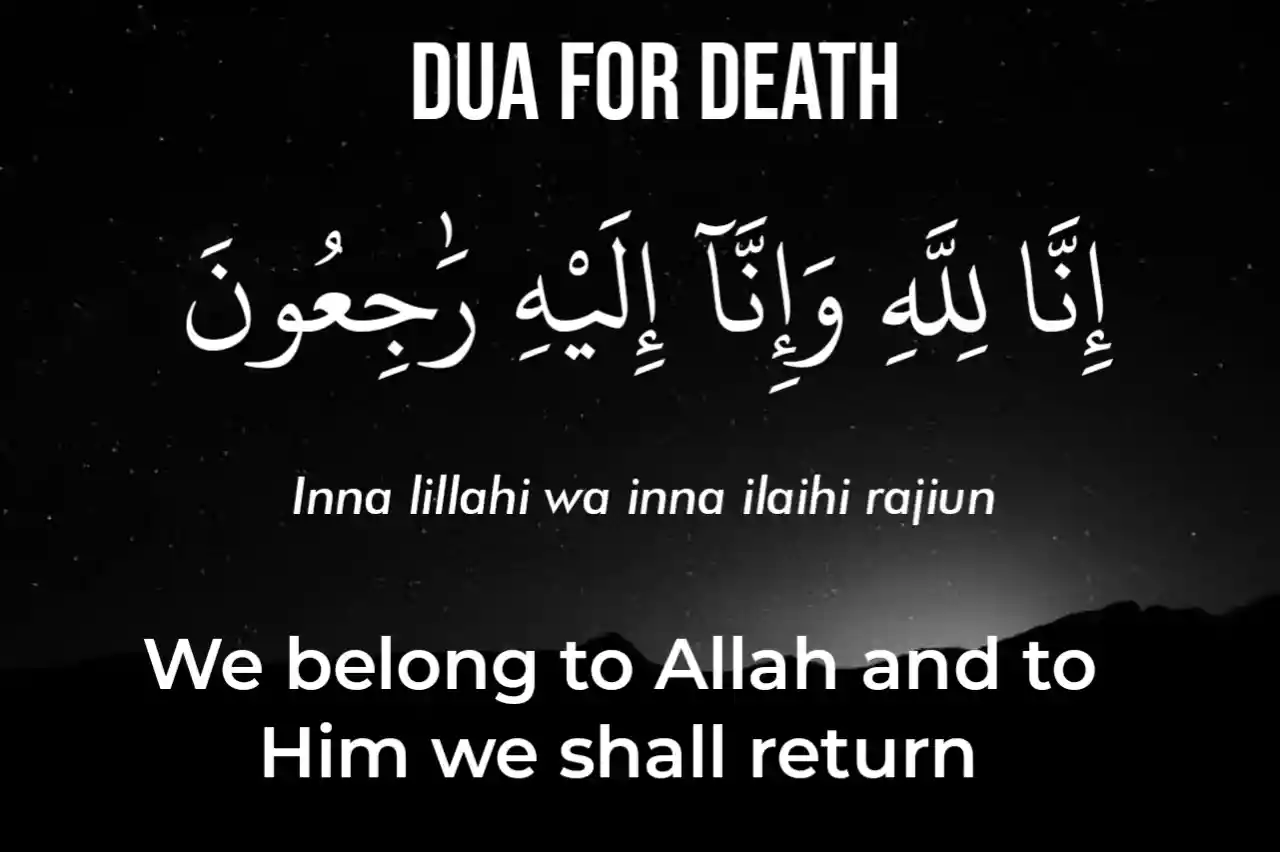
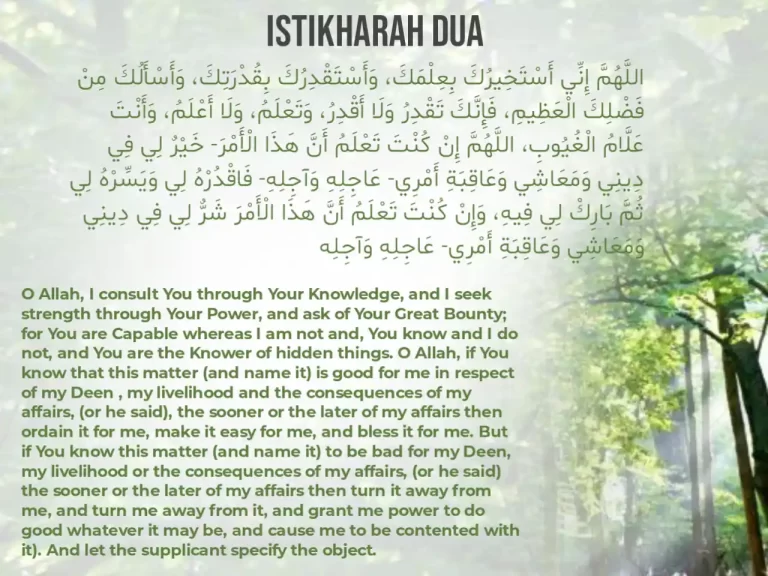



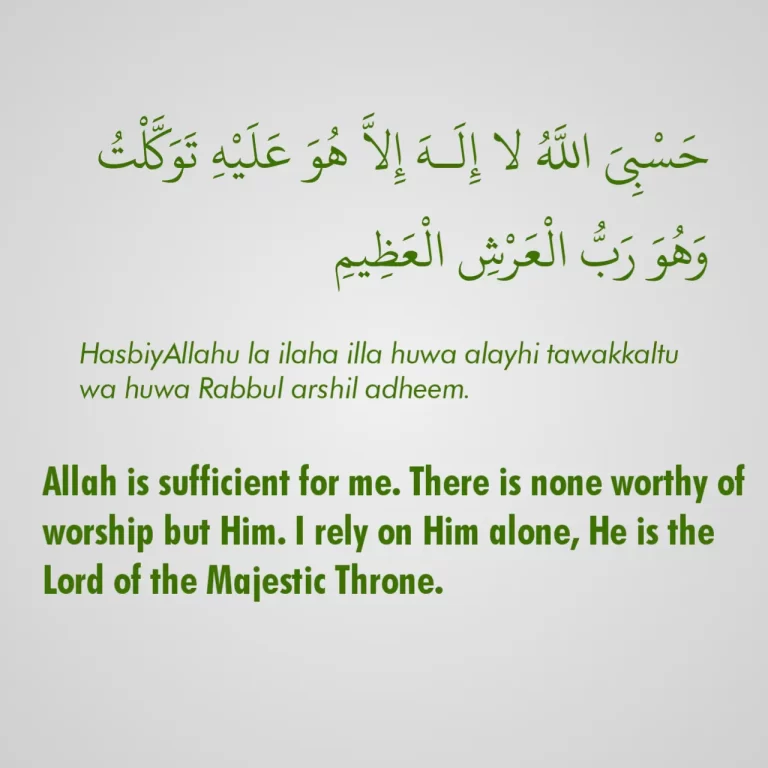
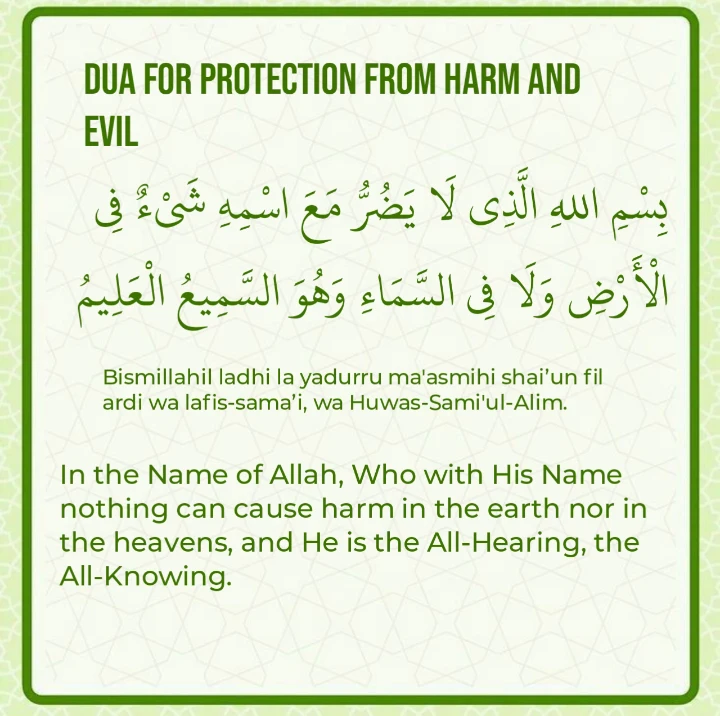
2 Comments